
Chester
Background
Chester, Pennsylvania, is the place where William Penn first landed in Pennsylvania. Chester is located along the Delaware River, just south of Philadelphia. The population in Chester is 74% Black, with 33% of the population living below the poverty line. Over the last 50 years, Chester has experienced a large number of pollution emitting sources contributing to health problems in the community.
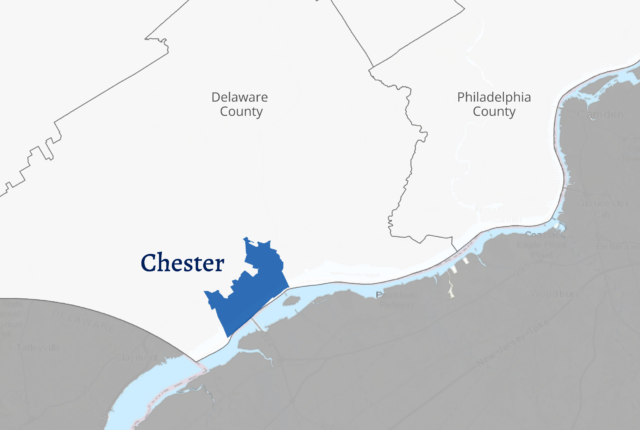
Hazard Profile
Chester’s unprecedented number of industrial polluting facilities include a trash incinerator, a sewage treatment plant, oil refineries, and more. There are 11 industries that emit carcinogens in Chester; some emitting tens of thousands of pounds of carcinogens every year. Solid waste from a large geographic area of Pennsylvania, as well as New York and Baltimore, are incinerated in Chester. Raw sewage and associated sludge from 46 municipalities in Philadelphia, Delaware, and Chester Counties are treated in Chester. Chester residents experience the air pollution from about 100,000 vehicles traveling on interstate highway I-95 every day.
Many Chester residents live in very old housing stock, which may lead to exposure to poor indoor air quality, lead, mold, pesticides, and safety concerns. Chester residents express concerns about the health effects of living and working amid toxic substances, and complain about frequent illness, which they perceive as likely associated with environmental factors. Chester has among the highest age-adjusted mortality and incidence rates for leukemia, and cancers of the prostate, lung, and trachea and has the highest infant mortality rate in Pennsylvania. In addition, Chester has twice the rate of asthma as the PA state level.
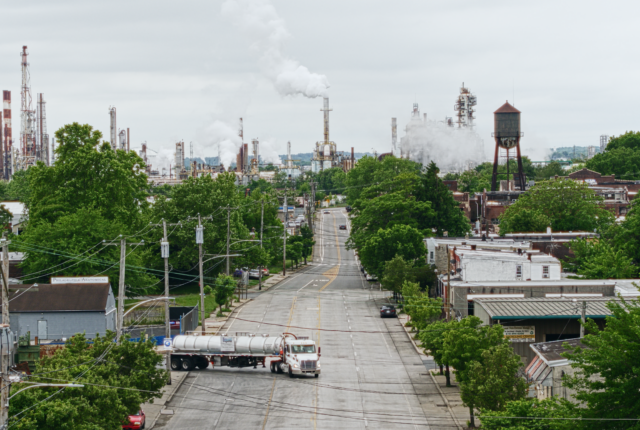
Map of Criteria Air Pollution and Traffic in Chester
The map below shows the annual emissions of criteria air pollutants by industries in Chester and the average daily traffic on roadways in the area. Click on the yellow circles to learn the name of the industry and the emissions in tons.
CEC Activities
The CEC is a founding member of the Chester Environmental Partnership. We continue to provide environmental health expertise on various health and environmental justice issues. Our activities include programming engaging community members in environmental health issues, community engaged data collection and research, and discussions with industry and regulatory agencies on permit violations and policies that influence public health risk for vulnerable populations in the community.
Working Together with CEP to Reduce Pollution
The CEC is working with the Chester Environmental Partnership to evaluate the risks of proposed liquified natural gas (LNG) plants in Chester. Chester residents are concerned about fugitive methane emissions resulting in extreme heat and exacerbating climate change and the potential explosion hazard. Citing an LNG export facility in or near Chester would increase risks to the community. The CEC provided written testimony to the Philadelphia LNG Task Force describing these environmental health and safety risks.
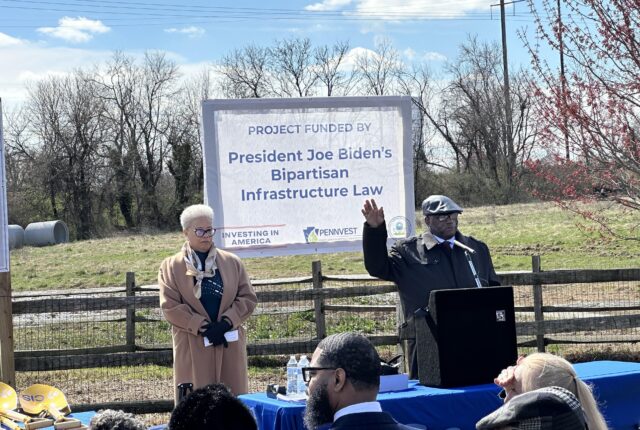
Save Your Soles
Diabetes can lead to poor circulation of extremities, and if left untreated could lead to amputation. Black males suffer major lower extremity amputations almost four times as often as white males in the Delaware Valley. To address this problem, the CEC has worked with podiatrist Dr. Ron Renzi, founder of Save Your Soles, a campaign aimed at reducing lower extremity amputation by community education and screening. For 10 years, Save Your Soles has been held annually at Chester City Hall. This event includes podiatric foot evaluations (Dr. Renzi), blood pressure and glucose screening, education on nutrition, diabetes management (Chester DOH), and environmental health (CEC). Amputation rates have fallen in Chester over the last 10 years.
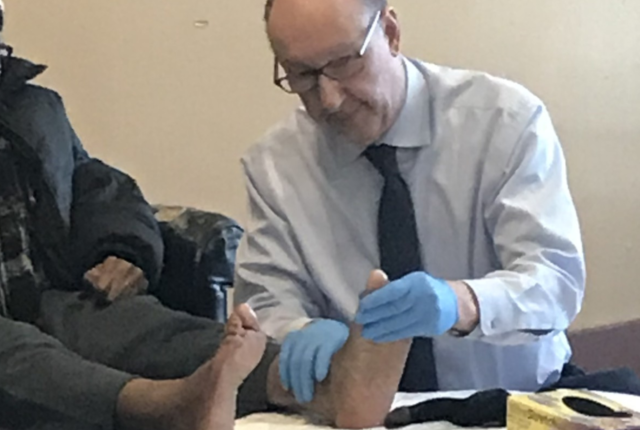
Community Engaged Neighborhood Air Monitoring
Through our engagement with the Chester Environmental Partnership, we have heard community concerns about air pollution over many years. The CEC collected pilot data in Chester neighborhoods and identified wide variations in air pollutant levels on different days and times. The CEC partnered with then CEET researcher Peter DeCarlo (now at the Johns Hopkins EHS CC), the PA DEP Air Monitoring Division, and the Delaware County Planning Department to apply for an ARP Enhanced Air Quality Competitive Grant to explore neighborhood air pollution further. This grant was awarded to the DEP and will fund the installation of monitors in local neighborhoods in Chester to gather air quality data.
The CEC working with the Delaware County Planning Department will engage the residents around health issues and the data and its implications. The CEC has been involved in the planning of where the monitors should be placed in the community and in designing community engagement materials.

Our Partnerships in Chester
CEC Resources
Explore our resources to find helpful information and programs relevant to the Chester community. View our Community Resources page to view all our resources.

Neighborhood Air Quality Monitoring for Delaware County
Poster Poster developed for the Neighborhood Air Quality Monitoring for Delaware County program.
Liquified Natural Gas (LNG) Export Facility in Chester Testimony
Testimony Testimony to Philadelphia City Council on March 17, 2019 on their Lead Safe Certification of Rental Housing bill.
Lead Safe Certification of Rental Housing
Testimony Testimony to Chester City Council on April 12, 2023 in support of their Lead Safe Certification of Rental Housing bill.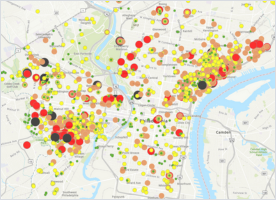
Lead Soil Map
GIS Map View our resources on lead, including our lead soil map with over 3,900 soil samples representing 86% of census tracts in Philadelphia.
How to Collect Soil Samples for Lead Testing
Document Written instructions on how to collect soil samples for lead testing.
Lead: It’s Still a Problem (English & Spanish)
Brochure Information on lead, the health effects of lead poisoning, and ways to reduce exposure.
Effects of Lead on Children’s Health
Infographic Infographic on the effects of lead on children’s health.
Is Your Water Pipe Made of Lead?
Infographic Step-by-step guide on how to check if you have lead pipes and ways to reduce exposure to lead through drinking water.
Mandatory Lead Certification for all Philadelphia Contractors
Policy brief Policy brief for establishing a bill in Philadelphia to require all contractors to receive lead safe certification.
Indoor Air Pollution (English & Spanish)
BROCHURE Information on sources of indoor air pollution in the home and how to reduce health effects from indoor air pollution.
Children and Outdoor Pollution (English & Spanish)
BROCHURE Information on outdoor pollution and the potential health outcomes for asthmatic children.Get Involved
Do you live or work in this community and would like to get involved with our work? Please contact us!
Contact Us


